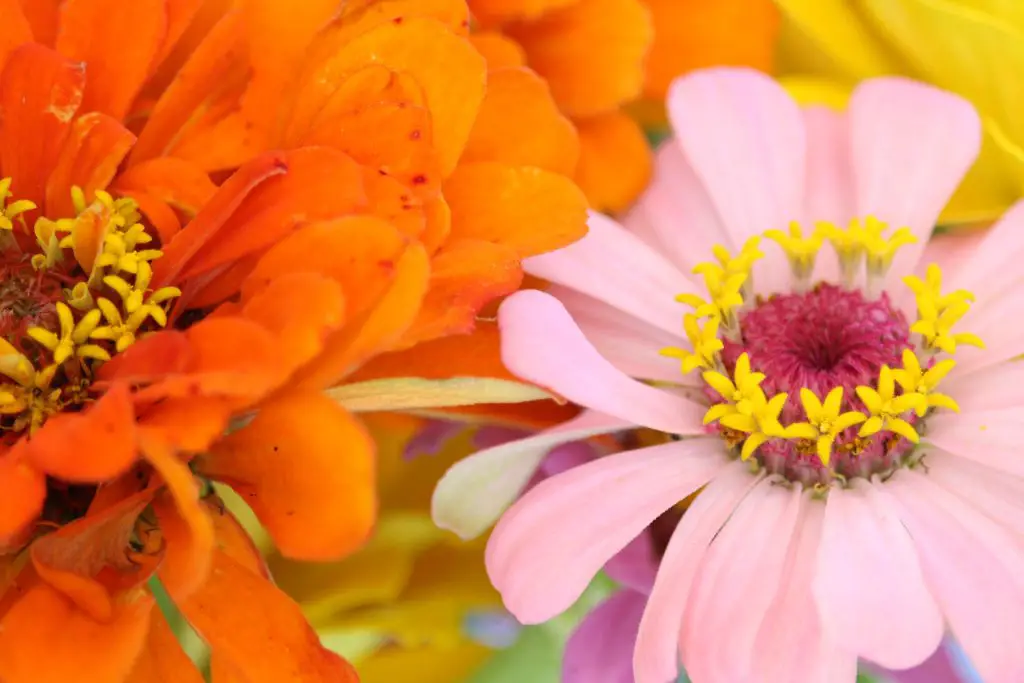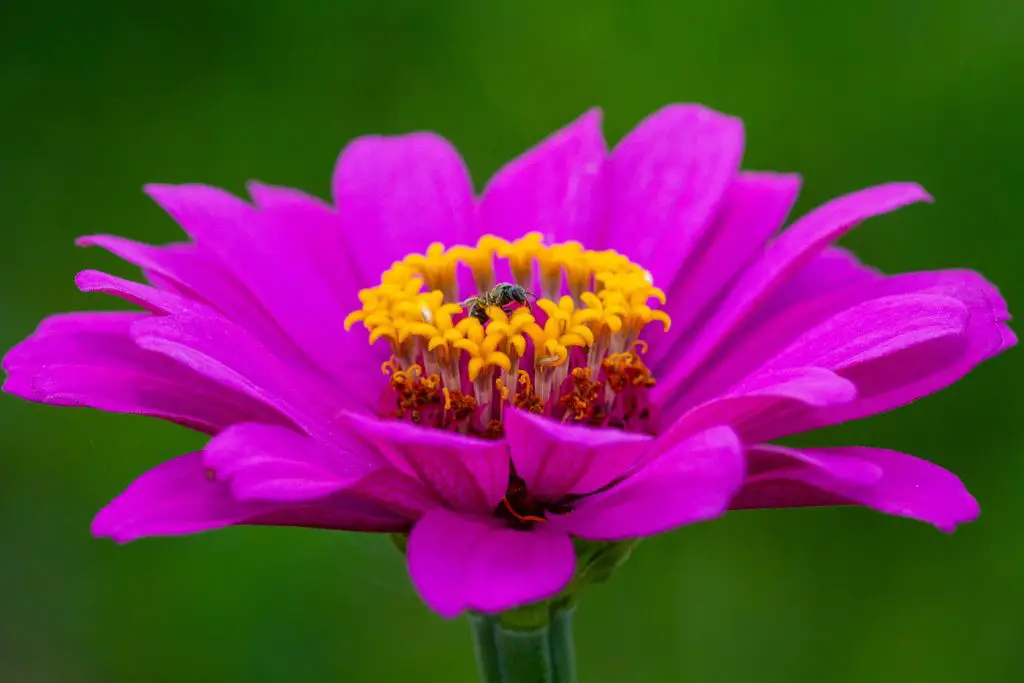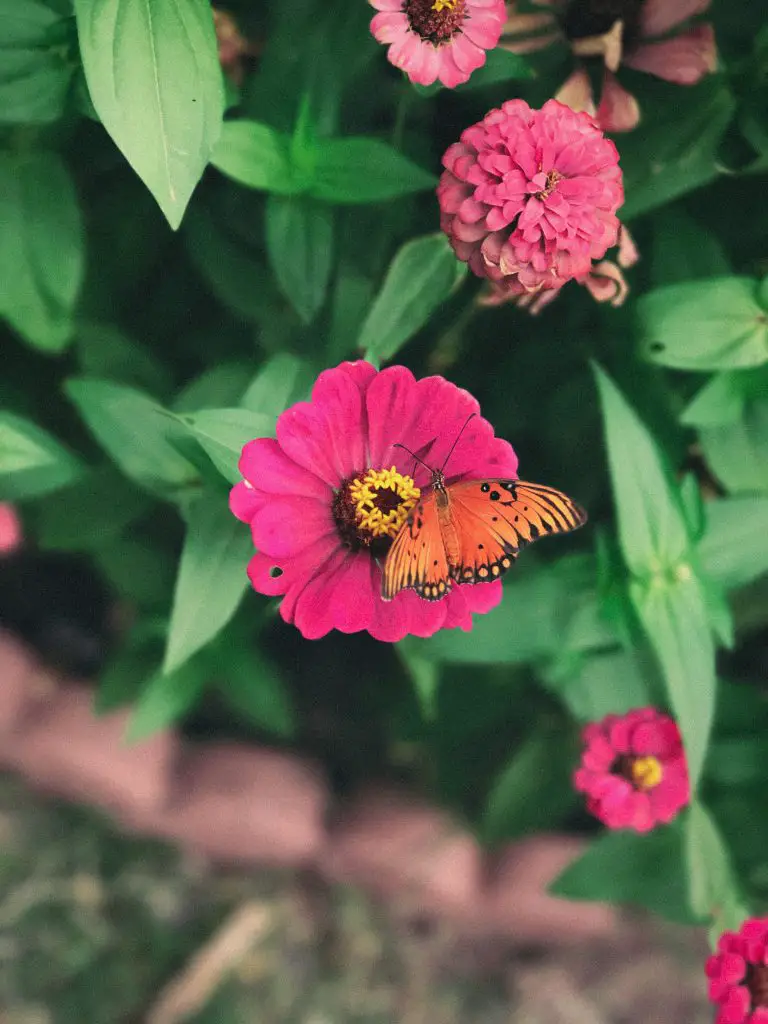Zinnias are one of the most popular flowering plants grown in gardens and landscapes. They attract hummingbirds, bees, and butterflies and also give your yard a pop of color throughout spring, summer, and fall. However, if you had too many of them can you feed them to the chickens? Is it safe for your feathered friends or not?
Zinnia flowers and foliage are safe to feed the chickens, and they will eat them though, it is not their favorite food. However, Zinnias are an extremely nutritional plant for the chickens as they are an excellent source of beta-carotene, which is a type of carotenoid pigment that gives plants their vibrant colors.
These yellow-based pigments are essential for healthy vision, immune function, and healthy skin as they protect against harmful UV rays. In addition to this zinnias are also chock full of other nutrients including vitamin K, manganese, phosphorus, copper, calcium, and more.
As they are a low-maintenance plant that does well in most soil types and is an excellent choice to grow in your garden as a way of supplementing the diet of your chickens and providing them with variety in their diet.

Will Chickens Eat Other Types Of Flowers?
There are many other types of flowers that chickens can and will eat aside from Zinnias, however, if you are selecting them from your ornamental garden it is important to double-check their toxicity. The reason for this is because there is a wide number of common garden plants that are extremely toxic and can cause serious problems with your chickens. For example, foxgloves are extremely toxic and will kill your chickens if they are eaten.
However, there are also a number of other flowers that the chickens can use safely some of the common ones include nasturtiums, dandelions, marigolds, violets, and lavender flowers. Defined more plants that you can potentially feed to your chickens try the University of California website list which has a detailed of list toxic plants and those that are safe.
Can You Feed Chickens Zinnias That Have Died Back?
The short answer is no, not because there is anything particularly wrong with feeding Zinnia plants that have died back in terms of toxicity, but because most chickens are typically not interested in dried-up foliage. Chickens for the most part prefer green fresh leaves with relatively soft flesh.
It is common for some people to provide the chickens with leafy greens on woody stems. You will find that the animals will strip the foliage from the branches and leave the remainder in the pen untouched.
However, if the flower petals are brown and the rest of the plant is green it is usually ok to feed the plant to the chickens. But it is generally best to only provide chickens with fresh possible greens whether they be zinnias or anything else for the matter.

Can You Feed Chickens Too Many Zinnias?
Some people say that you can feed your chickens too many zinnias. But there is no scientific research to support this claim. If you want to give your chickens some zinnias, the best thing to do is just make sure they are part of a well-balanced that is varied. If you do this it is quite unlikely that you will have any sort of problems with feeding your chickens too many zinnias.
What Types Of Plants Should Chickens Be Eating?
As mentioned above chickens should be eating a wide variety of different plants which will help supplement their diet which the most chickens will primarily consist of commercial chicken food. To provide them with this relatively broad diet it is best to give them vegetable scraps each and every time you prepare your meal at night.
These vegetable scraps should ideally contain leafy greens such as lettuce, chard, spinach, and any leafy green herbs that you have on hand along with a range of fruit and vegetables which can include things like pumpkins, zucchinis, ripe tomatoes, and even hot peppers to name a few possible options.
However, it is a good idea to ensure that you only supply them with things that you would potentially put in a dish for yourself. The reason for this is that this ensures that there is no chance of there being any toxic chemicals present that can affect the health of your chickens.
However, there are a couple of fruits such as green tomatoes and green potatoes that you should not feed to your chickens as they contain chemicals that are toxic to the chickens. Additionally, it should not be assumed that the foliage of all edible plants is safe. For example, the foliage of Solanaceae plants which includes, tomatoes, peppers, and potatoes all contain a toxin which will negatively affect your chickens.
As mentioned above, it is generally a good idea to avoid ornamental plants in your garden as there is an increased likelihood that they will be toxic so unless you’re absolutely 100% sure about the toxicity of the plant do not give them to your chickens.

Can You Feed Chickens Stale Or Moldy Food?
If you’re wondering whether you can feed stale or moldy food to chickens, the answer is no. Chickens will not eat moldy food because it contains bacteria, mold and toxins. The same goes for stale or improperly stored foods. If your birds are caught eating moldy or stale food, they will most likely die of salmonellosis.
In the case of moldy zinnias, it could also cause more serious health problems like thiamine deficiency which is caused by an enzyme produced by mold in a nutritious diet that can lead to nerve damage and heart failure if left untreated. So, avoid feeding your birds moldy or stale foods to prevent any potential health risks.
Conclusion
Chickens can eat a wide variety of food, but they do need a certain amount of fresh, healthy greens to stay healthy. The best plants for chickens are various types of vegetables and herbs. Zinnias are safe for chickens to eat but need to be provided to the chickens as part of a well-balanced diet.
Relevant Articles
Can Chickens Eat Green Tomatoes? Is It Safe?
Can Chickens Eat Leek? Is It Safe?
Can Chickens Eat Jalapenos? Is It Safe?
Can Chickens Eat Brussel Sprouts? Is It Safe?

